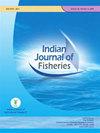Impact of skill development trainings on fish farmers’ knowledge and attitude: A case study from Bihar, India
IF 0.3
4区 农林科学
Q4 FISHERIES
引用次数: 0
Abstract
Skill development training aims to impart new knowledge and skill as well as build up favourable attitude among trainees.Evaluating the farmers’ knowledge and attitude towards skill development trainings will help to assess effectivenessof training as well as adoption probability of the acquired knowledge/skill. This research paper evaluated the impactof skill development training on fish farmers’ knowledge and attitude, in different districts of Bihar. Primary data werecollected from randomly selected trainees (250 Nos.), using feedback proforma and mobile phonic survey methodology.The first three levels of training evaluation model given by Kirkpatrick and Kirkpatrick were followed for measuring theimmediate impact of skill development training. Data were subjected to descriptive and Z-test statistics. The findingsrevealed that skill development training had significant (p=0.000) positive impact on the knowledge level of trainees.They exhibited favourable attitude towards skill development trainings and would be potential adopters of the acquiredknowledge and skills. Keywords: Attitude, Fish farmers, Impact evaluation, Kirkpatrick model, Knowledge, Skill development training技能发展培训对养鱼户知识和态度的影响:来自印度比哈尔邦的案例研究
技能发展培训旨在传授新知识和技能,并在学员中建立良好的态度。评估农民对技能发展培训的知识和态度将有助于评估培训的有效性以及所获得的知识/技能的采用概率。本研究在比哈尔邦不同地区评估了技能发展培训对养鱼户知识和态度的影响。使用反馈形式和移动电话调查方法,从随机选择的250名学员中收集主要数据。采用Kirkpatrick和Kirkpatrick提出的前三个层次的培训评估模型来衡量技能发展培训的直接影响。数据进行描述性和z检验统计。结果显示,技能发展培训对受训人员的知识水平有显著的正向影响(p=0.000)。他们对技能发展培训表现出良好的态度,并将成为所获得知识和技能的潜在采纳者。关键词:态度,养鱼户,影响评价,Kirkpatrick模型,知识,技能发展培训
本文章由计算机程序翻译,如有差异,请以英文原文为准。
求助全文
约1分钟内获得全文
求助全文
来源期刊

Indian Journal of Fisheries
FISHERIES-
CiteScore
0.90
自引率
20.00%
发文量
0
审稿时长
6-12 weeks
期刊介绍:
Indian Journal of Fisheries is published quarterly by the Indian Council of Agricultural Research (ICAR), New Delhi. Original contributions in the field of Fish and fisheries science are considered for publication in the Journal. The material submitted must be unpublished and not under consideration for publication elsewhere.
Papers based on research which kills or damages any species, regarded as thratened/ endangered by IUCN crieteria or is as such listed in the Red Data Book appropriate to the geographic area concerned, will not be accepted by the Journal, unless the work has clear conservation objectives.
 求助内容:
求助内容: 应助结果提醒方式:
应助结果提醒方式:


